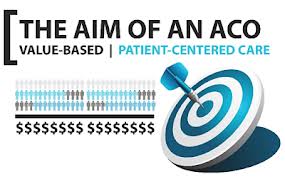 While many have been quick to defend the slow rise of Accountable Care Organizations (ACOs), many others are looking not at the slowness of the climb, but the inconsistency.
While many have been quick to defend the slow rise of Accountable Care Organizations (ACOs), many others are looking not at the slowness of the climb, but the inconsistency.
 While many have been quick to defend the slow rise of Accountable Care Organizations (ACOs), many others are looking not at the slowness of the climb, but the inconsistency.
While many have been quick to defend the slow rise of Accountable Care Organizations (ACOs), many others are looking not at the slowness of the climb, but the inconsistency.
Circling back to the entire point of ACO formation in the U.S. there were two distinct motivations:
1) the care previously provided by independent physicians was more often than not uncoordinated and
2) the fee-for-service payment model was inefficient and made the incentive for physicians providing more care not necessarily good care.
The solution, then, appeared to be that we should implement some kind of system where physicians pool together to treat patients- something that can happen even in the non-physical realm with the advent of the electronic health record- and change our payment model to reflect not quantity of services, but their quality.
Types of ACOs
Thus, ACOs were born. And in theory, they seem to be a superlative solution to the two major problems in modern healthcare. In practice, however, they appear to be coming up short.
There are reported to be around 600 ACOs in the United States currently, and they are subdivided into three different models:
- Medicare Shared Savings Programs are a combination of calculated cost and fee-for-service payments, both are determined by a physician’s previous performance measures. Thus far, of the 114 programs around 54 have actually achieved savings within the first year.
- Pioneer ACO models are the brainchild of the Center of Medicare and Medicaid Innovation (CMMI). They are geared toward practices or groups that already have a solid infrastructure for dealing with prepayment and while they may have seemed to be a good idea initially, within the first year as many as a third of program participants withdrew.
- Commercial ACOs encompass far more arrangements that might appeal to hospitals undergoing ACO transition, and as many as half of the ACOs in the United States are in this category. The upside of these programs is that many hospitals have met their quality outcomes, but there has been no consistent, demonstrable cost-savings.
ACO Obstacles
The major factor that is complicating ACO’s success are, as previously mentioned, that they need to overcome the prevailing fee-for-service model. Since the goal is to improve value over time, to give up the fee-for-service model which is currently sustaining hospitals is an enormous leap of faith that many hospitals aren’t sure they can afford to take. While the idea of creating sustainable solutions to healthcare’s many problems seems noble enough, the fact of the matter is, a decrease in revenue from abandoning the relatively easy fee-for-service payment model is a daunting prospect.
While no one wants to provide subpar care, the truth of the matter is, patients have more complex health needs than ever before and they also have more access to information – much of which can be confusing and conflicting – meaning they are more involved than ever in their own care. Doctors understand that times are changing, but to move away from a familiar payment model is challenging.
ACOs | Patient Needs vs. The Bottom Line
The patient’s needs and the financial bottom line are at odds in a big way, and it’s going to be incredibly difficult to reconcile the differences. What adds to the difficulty is that while technology seems to be advancing at the speed of sound, hospitals that are already financially hard-pressed are not exactly embracing these time consuming – and wallet draining- programs. Furthermore, the Meaningful Use requirements set forth from HiTECH legislation indicate that interoperability is the end-all be-all of the programs, but anyone who has experience with EMRs knows that this is far easier said than done. Even when the electronic records are in working order and aren’t in the midst of a major upgrade or technical glitch, user – confidence is an ongoing issue that hospitals have to face. The reality is, the generation of doctors, nurses and allied health professionals who are being asked to incorporate these electronic systems into their workflows did not grow up with computers in their classroom and they aren’t all that interested in making huge changes. The next generation of health professionals is between a rock and a hard place: being educated by traditional physicians who demonstrate resentment toward change on principal, but still expect their underlings to abide by the most current legislative practices.
ACOs | Physician Leadership
For top tier physicians who have built their entire careers around the fee-for-service model of payment, the idea of making such an enormous process change at this phase of the game probably seems impossible. Similarly, it’s unlikely that they are interested in leading the charge for reform when they may not be able to see, fully, how the fee-for-service model has corrupted the healthcare system. And if there is a lack of physician leadership, the next place to look is administrative leadership. Likewise, if the CEO has not embraced the concerns and perspective of the physician leaders, a chasm between these two leaders will only cause the hospital to crumble.
ACOs & The Future
It’s probably too soon to tell if ACOs will succeed in the long term – and certainly, they are off to a shaky start. Healthcare is at a major turning point and if hospitals and their leaders can figure out how to face these obstacles rather than resist them, that will be the true test of whether ACOs will sink – or swim.







